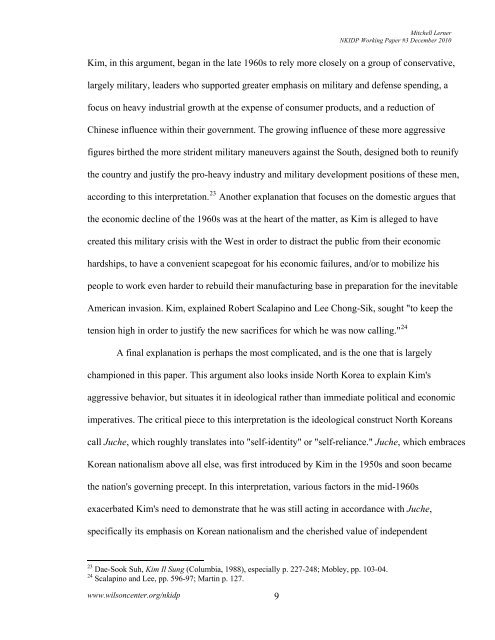"Mostly Propaganda in Nature:" Kim Il Sung, the Juche Ideology, and ...
"Mostly Propaganda in Nature:" Kim Il Sung, the Juche Ideology, and ...
"Mostly Propaganda in Nature:" Kim Il Sung, the Juche Ideology, and ...
You also want an ePaper? Increase the reach of your titles
YUMPU automatically turns print PDFs into web optimized ePapers that Google loves.
Mitchell Lerner<br />
NKIDP Work<strong>in</strong>g Paper #3 December 2010<br />
<strong>Kim</strong>, <strong>in</strong> this argument, began <strong>in</strong> <strong>the</strong> late 1960s to rely more closely on a group of conservative,<br />
largely military, leaders who supported greater emphasis on military <strong>and</strong> defense spend<strong>in</strong>g, a<br />
focus on heavy <strong>in</strong>dustrial growth at <strong>the</strong> expense of consumer products, <strong>and</strong> a reduction of<br />
Ch<strong>in</strong>ese <strong>in</strong>fluence with<strong>in</strong> <strong>the</strong>ir government. The grow<strong>in</strong>g <strong>in</strong>fluence of <strong>the</strong>se more aggressive<br />
figures bir<strong>the</strong>d <strong>the</strong> more strident military maneuvers aga<strong>in</strong>st <strong>the</strong> South, designed both to reunify<br />
<strong>the</strong> country <strong>and</strong> justify <strong>the</strong> pro-heavy <strong>in</strong>dustry <strong>and</strong> military development positions of <strong>the</strong>se men,<br />
accord<strong>in</strong>g to this <strong>in</strong>terpretation. 23 Ano<strong>the</strong>r explanation that focuses on <strong>the</strong> domestic argues that<br />
<strong>the</strong> economic decl<strong>in</strong>e of <strong>the</strong> 1960s was at <strong>the</strong> heart of <strong>the</strong> matter, as <strong>Kim</strong> is alleged to have<br />
created this military crisis with <strong>the</strong> West <strong>in</strong> order to distract <strong>the</strong> public from <strong>the</strong>ir economic<br />
hardships, to have a convenient scapegoat for his economic failures, <strong>and</strong>/or to mobilize his<br />
people to work even harder to rebuild <strong>the</strong>ir manufactur<strong>in</strong>g base <strong>in</strong> preparation for <strong>the</strong> <strong>in</strong>evitable<br />
American <strong>in</strong>vasion. <strong>Kim</strong>, expla<strong>in</strong>ed Robert Scalap<strong>in</strong>o <strong>and</strong> Lee Chong-Sik, sought "to keep <strong>the</strong><br />
tension high <strong>in</strong> order to justify <strong>the</strong> new sacrifices for which he was now call<strong>in</strong>g." 24<br />
A f<strong>in</strong>al explanation is perhaps <strong>the</strong> most complicated, <strong>and</strong> is <strong>the</strong> one that is largely<br />
championed <strong>in</strong> this paper. This argument also looks <strong>in</strong>side North Korea to expla<strong>in</strong> <strong>Kim</strong>'s<br />
aggressive behavior, but situates it <strong>in</strong> ideological ra<strong>the</strong>r than immediate political <strong>and</strong> economic<br />
imperatives. The critical piece to this <strong>in</strong>terpretation is <strong>the</strong> ideological construct North Koreans<br />
call <strong>Juche</strong>, which roughly translates <strong>in</strong>to "self-identity" or "self-reliance." <strong>Juche</strong>, which embraces<br />
Korean nationalism above all else, was first <strong>in</strong>troduced by <strong>Kim</strong> <strong>in</strong> <strong>the</strong> 1950s <strong>and</strong> soon became<br />
<strong>the</strong> nation's govern<strong>in</strong>g precept. In this <strong>in</strong>terpretation, various factors <strong>in</strong> <strong>the</strong> mid-1960s<br />
exacerbated <strong>Kim</strong>'s need to demonstrate that he was still act<strong>in</strong>g <strong>in</strong> accordance with <strong>Juche</strong>,<br />
specifically its emphasis on Korean nationalism <strong>and</strong> <strong>the</strong> cherished value of <strong>in</strong>dependent<br />
23 Dae-Sook Suh, <strong>Kim</strong> <strong>Il</strong> <strong>Sung</strong> (Columbia, 1988), especially p. 227-248; Mobley, pp. 103-04.<br />
24 Scalap<strong>in</strong>o <strong>and</strong> Lee, pp. 596-97; Mart<strong>in</strong> p. 127.<br />
www.wilsoncenter.org/nkidp 9

















